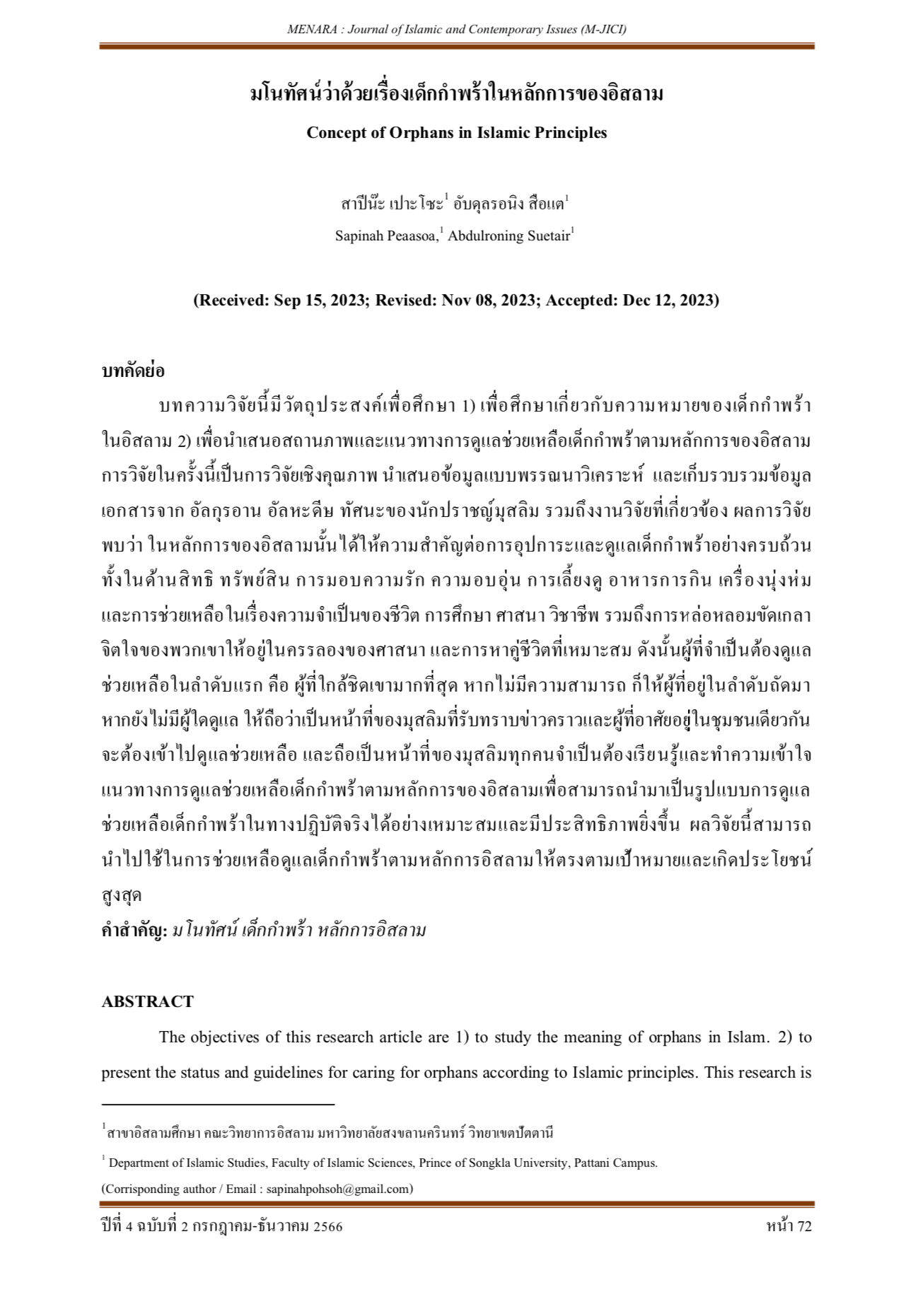Concept of Orphans in Islamic Principles
Keywords:
Concept, Orphans, Islamic principlesAbstract
The objectives of this research article are 1) to study the meaning of orphans in Islam. 2) to present the status and guidelines for caring for orphans according to Islamic principles. This research is qualitative research presenting data descriptively and analytically, and collecting document data from al-Quran, al-Hadith, views of Muslim scholars including related researches. The study found that in the principles of Islam, importance is given to the complete support and care of orphans in terms of rights, property, giving love and warmth, nurturing, food, clothing and support in the necessities of life, education, religion, profession, including molding and refining their minds based on of religious way of life, and finding the right life partner for them. Therefore, those who need to care for and help orphans in the first place are those closest to them. If they are not able to do it then the persons who are next in line. If there is still no one among those aforesaid qualified to do the job the duty to help the orphans, then, must be on those Muslims who receive news and live in the same community and it is considered the duty of every Muslim to learn and understand the guidelines for caring for orphans according to Islamic principles so that they can be used as a model of caring for orphans in actual practice with more appropriateness and efficiency. Research results can be used to help care for orphans according to Islamic principles to meet the goals and achieve maximum benefit.
References
ฉบับภาษาไทย
กรมพัฒนาสังคมและสวัสดิการ. (2563). สิทธิประโยชน์สำหรับเด็กและเยาวชน. กรุงเทพฯ: สำนักงานพัฒนาสังคมและความมั่นคงของมนุษย์.
บาหรี ม่าเหร็มและคณะ. (2539). บทธรรมเทศนาวันศุกร์. สตูล: โรงพิมพ์เมื่องสตูล.
พจนานุกรม ฉบับบัณฑิตยสถาน. (2525). กรุงเทพฯ: ศิริวัฒนาอินเตอร์พริ้นท์.
วรพร เกวลิน. (2564). การดูแลเด็กที่ถูกทอดทิ้งอย่างครบวงจร. กรุงเทพฯ: จุฬาลงกรณ์มหาวิทยาลัย.
สมาคมนักเรียนเก่าอาหรับแห่งประเทศไทย. (2542). พระมหาคัมภีร์อัล-กุรอานพร้อมคำแปลเป็นภาษาไทย. มะดีนะฮ์: ศูนย์กษัตริย์ฟาฮัดเพื่อการพิมพ์อัลกุรอาน.
อบุล อะลา เมาดูดี. (2545). ตัฟฮีมุลกุรอาน. บรรจง บินกาซัน (แปล). กรุงเทพฯ: บริษัท ออฟเพรส จำกัด.
ฉบับภาษาต่างประเทศ
Aisyah Kara. (2022). Kontribusi Mulnithi Nusantara (Yayasan Nusantara) Terhadap Pemberdayaan Anak Yatim. Malaysia: Universitas Islam Negeri (Uin) Alauddin.
Ahmad bin Hanbal, (1993). Musnad al-Imam Ahmad bin hanbal. Beirut: Mu assasah al-Risalah.
al–Qurtubiy, Abi Abdullah .(2006). Tafsir al–Qurtubiy. Beirut: Dar Ihya’ al– Turath al–Arabiy.
al–Misriy. (1993). Lisan al–Arabiy. Beirut: Dar Sadir.
al-Tabariy, Abi Ja‘far Muhammad Ibn Jarir. (2001). Tafsir al-Tabari Jami‘ al-Bayan ‘an Ta’wil’ ay al-Qur’an. Qahirah: Hijr.
Ibn al-Arabi. (2008). Ahkam al-Quran. Beirut: Maktabat al-Asriyah.
Ibn Kathir, Abu Fidaa’ Ismaiil bin Kathir Alqurashi. (2010). Tafsir al–Quraan al-‘Azim. Beirut: Maktabat al–Asriyah.
Muslim Ibn Hajjaj. (1955). Sahih Muslim. Beirut: Dar Ihya’ al–Turath al-‘Arabi.

Downloads
Published
How to Cite
Issue
Section
License
Copyright (c) 2023 MENARA : Journal of Islamic and Contemporary Issues

This work is licensed under a Creative Commons Attribution-NonCommercial-NoDerivatives 4.0 International License.


